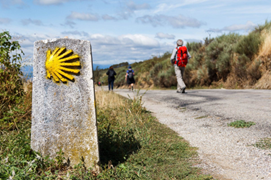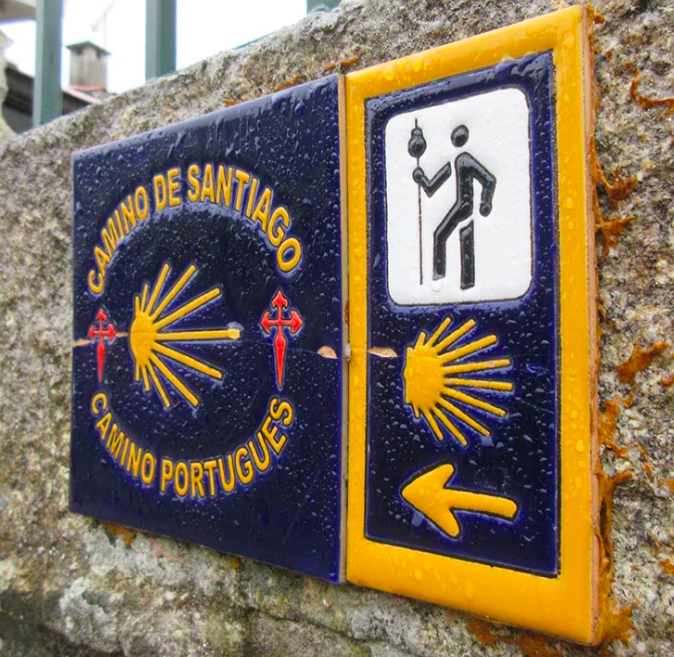Every year, thousands of people from around the world flock to Portugal, Spain, and France to begin the Camino de Santiago, known colloquially as “the Camino.” For over 1200 years, the Camino has acted as a pilgrimage route for many people from a wide range of backgrounds. The Camino de Santiago began as a Catholic pilgrimage in which believers travelled to Santiago de Compostela, where the apostle St. James’ remains are said to rest. In doing so, Catholics would not only grow stronger in their faith, but also enjoy plenary indulgence, absolution of all temporal punishment for one’s sins. After losing popularity for decades, the Camino has once again become well-travelled, with nearly 450,000 pilgrims walking it in 2022, but not by Catholics alone.
The Camino de Santiago does not describe a single path, but rather a vast network of trails that leads from France, Spain, and Portugal to the northern Spanish city of Santiago de Compostela. The most popular route, the Camino Francés, stretches over 800 kilometres, beginning in the French border town of Saint-Jean-Pied-de-Port, and takes most pilgrims between 30 and 40 days to complete. Along the route, pilgrims stay in albergues, inns specifically for pilgrims on the Camino. Many pilgrims walk between 15 and 30 kilometres per day, spending long days in Spain’s hills and plains along the Camino Francés. However, some opt for alternative routes, like the Camino del Norte, which follows the country’s dramatic coastal cliffs and mountain ranges. The length and intensity of these hikes tests the pilgrims’ physical and mental fortitude, challenging them to push their bodies and minds to the limits and providing plenty of time for hard-sought solitude and self-reflection, while acting as a unifying force for all pilgrims enduring the trek.


What has drawn so many people to the Camino? For many pilgrims, the experience provides an opportunity to undergo spiritual recentering, self-discovery, and a guide through periods of transition in their lives. Importantly, though they may not prioritise the traditional religious significance of the Camino, many pilgrims do express a desire to connect to a spiritual “Other,” whether it be God, the Universe, or any other expression of faith or spirituality. Still others pursue a deeper connection with themselves and the world, and often cite the value of “disconnecting to reconnect.” Most pilgrims are linked by their dissatisfaction regarding their sense of disconnection with themselves, the world around them, and their wider place in that world, and thus seek answers in the Spanish countryside.
For many pilgrims, the Camino fulfils their desires. Researchers at the University of Maribor, Slovenia, have found that pilgrims generally found life to be more meaningful and have dedicated themselves to self-actualization and self-transcendence because of their experiences on the Camino . Further, they reported increased values of universalism and benevolence along with a decrease in self-interest, in the process building both their individual identity and a group identity with other pilgrims. Interested in how these transformations occurred, the researchers devised a system of analysis they applied to a variety of travelogues. Their methodology tracks Exceptional Human Experiences (EHEs), in which people experience exceptional events (EEs) and undergo their Transformative Aftereffects (TAs) along their Camino. They found that many pilgrims experienced the EE of interconnectedness which was correlated to the TA of increased values of unity and love, followed by the EE of a deep calm and reconciliation that correlated with the TA of increased vulnerability. These experiences and their effects not only demonstrate the transformative power of the Camino, but also provide possible routes for peacebuilding. There might be aspects of the Camino experience that could be transferred to other contexts to enhance both inner and interpersonal peace.
Along the Camino, pilgrims from around the world embark on the same journey, regardless of their background, identity, and goals. This automatic commonality sets the groundwork for interpersonal peace by linking pilgrims to one shared experience, but does not fully encapsulate the multileveled impacts of the Camino. According to Silvia Aulet of the University of Girona in Spain, the experience of pilgrimage can act as a peacebuilding mechanism because it effectively engages the individual, social, and environmental dimensions of peace. The Camino first transforms the pilgrim’s self-image and self-conceptualization, allowing them to undergo the process of self-actualization. Further, the experiences on the Camino force the pilgrim to confront a variety of people of different life experiences, encouraging interculturalism and social justice, but also risking (and requiring people to work through) occurrences of intolerance and confrontation. Finally, throughout over 800 kilometres of hiking through France and Spain, pilgrims can begin to experience nature as a foundational element of human life, rather than merely a resource to support their lifestyles. The power of the Camino to integrate the self, society, and the world allows it to stand out as a path to both inner and interpersonal peace, and acts as a testament to the importance of slowing down, appreciating life and nature, and, as pilgrims say, “walking your own Camino.”
What do you think?
- Do you think spiritual experiences are effective at unifying people from different backgrounds?
- How long might such effects last, and do they need regular renewal?
- Are ‘exceptional experiences’ necessary for people to begin the process of self-actualization? And how connected is this kind of peacebuilding to privilege (leisure time, security, financial stability)?
- How do different ‘levels’ of peace (individual, social, environmental) interact and influence each other?
If you enjoyed this item in our museum…
You might also enjoy The Ecumenical Peace Pilgrimage to South Sudan, Douglas Gillespie’s ‘Path of Peace’, The Climb: Finding Peace in Mountaineering, and Peace and Transcendence: Awe-Inspiring Experiences.
Sofia LoBue, May 2024